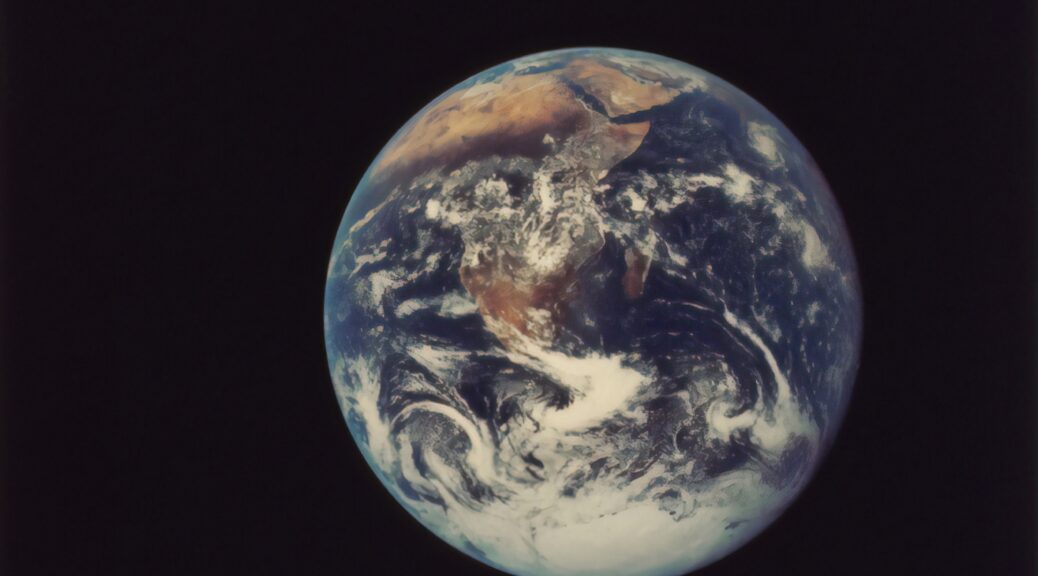
Our World
“Our planet was perfect – until a new force came along that tilted it off balance – humans.” (David Attenborough – BBC)
There seems to be a view that is growing in popularity that goes something like this:
‘The earth, with all it’s life and ecosystems, has been around for millions/billions of years, evolving into something approaching perfection. Very recently (on an evolutionary timescale), human beings have appeared, and their principal impact has been to pollute and destroy the earth and its other life forms’.
This view has other manifestations: ‘we are all guests on this planet, only here for a brief visit’; and through the current pandemic ‘nature is teaching us a lesson’; and so on.
At its core, there is an anti-Christian, long-age, evolutionary worldview which is in direct conflict with what the Bible teaches.
The whole subject of creation vs evolution is one I’ve looked into for many years – it’s a vast subject and no doubt will raise many questions.
But for now, let’s look at some of what the Bible does teach. Here are some key points:
- God created everything (Gen 1:1)
- More specifically, everything was created through and for Jesus Christ (John 1:3, Colossians 1:15–16
- The earth belongs to God (Psalm 24:1, 1 Cor 10:26)
- He made it for human beings (Genesis 1, 2; Isaiah 45:18), who were there at the beginning (Matthew 19:4
- After creating the man and the woman, God declared his creation “very good” (Genesis 1:31
- Men and women were tasked with dominion over the earth, but their Fall resulted in the whole creation being cursed (Genesis 3:17-18, Romans 8:20-22)
Of course, there’s much more than this, but it’s enough to show that the biblical view is entirely different from the story we’re being told on a daily basis.
One of the challenges I’ve faced when talking about this is ‘is it important?’, ‘does it really matter?’.
But the problem is that ideas have consequences.
If our young people are being told ‘there is no God, we’re here as a result of a cosmic accident, we have no more value than any other life form’, and then ‘actually, human beings are a scourge, they (we) are responsible for pollution, climate change, destruction of the forests, the cause of extinction of many species’ etc, then how can we be surprised when they develop mental health problems? Any sense of purpose or meaning has been taken away – yet those are the things we crave.
The logical conclusion of this line of thinking is to say that if humans are the problem, the world would be better off without them, and that can lead to appalling consequences. For those who don’t want to be that extreme, the only way forward is for a radical change in humanity, but if humans are late-comers to the world and we are what we are, then what are we trying to change ourselves into? There is no ‘model’, no example.
Biblically, the consequences of the Fall are not good. The worst, of course, are death and separation from God. But the fact that mankind was in a perfect world, and walked with God, means that there is hope of restoration. We are not what we were originally intended to be, nor is the earth, but that opens the possibility of a recovery to where we should be, where we were meant to be.
Not that we can achieve that ourselves, but it is something our Creator has chosen to do for us. In Christ, God is bringing everything back to the place where it should be (Colossians 1:15-20). And in Jesus, we see a model of what we can be, a pattern of what is to come (1 John 3:2).
When I was at university, we’d go ‘door knocking’ to talk to other students about Christianity. Naturally, there were all manner of topics that were thrown up for debate. But we were told that wherever possible ‘talk about Jesus’. Keeping him central gets to the core of things (a good principle!).
The consequences of the Christian message are reconciliation, restoration, peace, as well as purpose and meaning. It also explains why we crave purpose and meaning.
So yes – this is important.
We are faced with an onslaught of ideas, worldviews and philosophies that will take us away from God. We need to stand up to them, sometimes that’s hard, but the best starting point is to go to the Person and Work of Jesus.
2 Corinthians 10:3-5 says how this is all part of a bigger battle, but God has equipped us with powerful weapons. The aim isn’t just to win arguments (actually Paul here says we should destroy them!), but it’s to focus on Jesus.
Because ultimately, he is the centre of all things (Colossians 1:17-18).